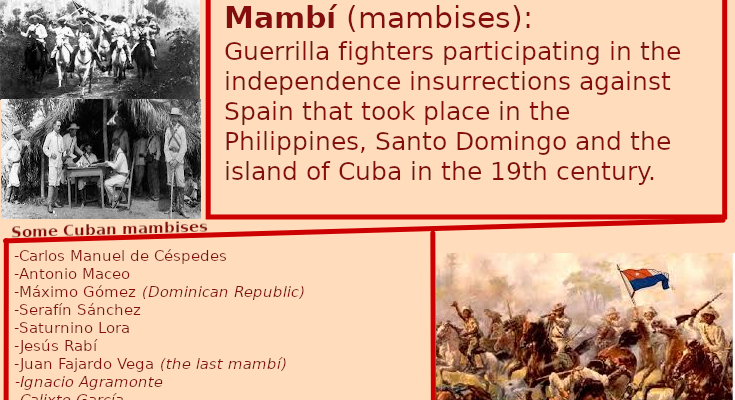Mambí. Guerrilla fighters participating in the independence insurrections against Spain that took place in the Philippines, Santo Domingo and the island of Cuba in the 19th century; it was first used in Santo Domingo by Hispanics to refer in a derogatory way to those who fought to overthrow Spanish colonialism. From there it passed to Cuba, after the uprising in the sugar mill of La Demajagua, led by Carlos Manuel de Céspedes.
So the Spaniards who had come from Santo Domingo saw a similarity between the Dominican fighters and the Cubans, so they returned to use the term “Mambí” (plural _¨mambises¨).
The mambí soldiers made up most of the National Army of Liberation and were the key soldiers responsible for the success of the Cuban liberation wars. They consisted of Cubans from all social classes including white Cubans, free black people, slaves, and mulattos. During the Ten Years’ War, slaves were promised their freedom if they assisted the Creoles in the fight against the Spanish. The freeing of slaves to help fight was started by Carlos Manuel de Céspedes. At the end of the war, even though independence from Spain was not achieved, Spain agreed to honor the freeing of the slaves who had fought against them.
The mambí forces were made up of volunteers who mostly had no military training and banded together in loose groups who acted independently to attack the Spanish troops during the Ten Years’ War. It is estimated that 8,000 poorly armed and underfed mambises inflicted close to 20,000 casualties on the well-trained Spanish soldiers during the Ten Years’ War.
Similarly, by the end of the War of Independence the National Army of Liberation numbered nearly 50,000 of which only about 25,000 were armed. The leaders, having learnt from previous mistakes, had organized the army into “6 corps with 14 divisions, 34 brigades, 50 regiments of infantry and 34 cavalry.”
The Mambi army was composed of Cubans of all social classes, from Indians, slaves, free blacks and mulattos, to landowners like Carlos Manuel de Céspedes, known as the Father of the Cuban Nation, in addition to some foreigners who seeing that it was a just cause allied themselves with the Cubans to achieve independence and the abolition of slavery, among them were Chinese emigrants and from other nations[9] and even Spanish soldiers who joined the Mambi ranks.
The Mambi Army was the National Army of Liberation that defeated the Spanish through two wars: 1868 to 1878 and again, 1895 to 1898. Mambi is likely a Congo word. Recent estimates of the participation of Cubans of African descent in the Mambi Army run as high as 92%, but the more widely accepted figure in Cuba is 85%. This encounters resistance in Miami, where they prefer to think of the Mambi army as having a more important ibero spanish component.

